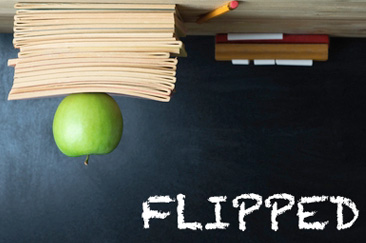Flipping the Science Lab
Written by Sarah Watt
Right tonight’s challenge is to write my first blog. Here’s hoping its inspiring enough for someone to read it and learn from it. As part of our AGS Inspire I chose to take part in the flipped learning session delivered by Jon on the success he had delivering this style of learning to PE students at Woodham. I loved the idea of this way of teaching and delved further into the research written by Jonathan Bergmann and Aaron Sams two science teachers in America who pioneered the ideas behind the flipped classroom. Geeky I know, but then I teach Science, is there anything much more geeky than that!
As part of our redevelopment of schemes of learning I was asked to write a scheme of work to fit the new rocks curriculum for key stage three, having listened to colleagues moan a few weeks back about the best way to teach the rather dull carbon cycle topic in their case to year 10 I had a light bulb moment and thought this is the opportunity I have been waiting for to try something new and see if it works in our classrooms here at AGS. After a discussion with Jon mainly over the video element to be set for homework, I had a starting point and a suggestion of how it would work in the classroom. I chose not to create my own video but use one about the subject matter from YouTube which I felt fit perfectly with the learning outcomes that I wanted from firstly the lesson and secondly the scheme of learning. The video I chose was only 4 minutes in length but had the necessary content for the work to be done in the lesson. In addition to watching the video students were asked to bring in some notes that they had taken whilst watching and their mobile phone complete with headphones so that they could refer back to the video in the lesson. So there in lies the cruncher – how many of my students would complete the homework and take advantage of a different style of learning? I did send out reminder text messages the day before, as it had been quite a gap between giving out the homework and seeing the group.
I was pleasantly surprised when the next day the class turned up and all apart from 6 hadn’t completed their homework. As to what I did with those, wait till later. I started the lesson with a plenary, which I had designed to find out who had watched the video and what had they taken in. I received the answers that I was hoping for so set about introducing the task that I wanted pupils to do. I asked pupils to write me a newspaper article designed for pupils of their age (giving the piece of work a focus as per our new literacy keys). They were given 45 minutes to complete the task and then decide on a gripping headline to attract people to read the story. Pupils were very focused and set about the task with gusto. The 6 who didn’t bother to complete their homework were given a text book and asked to simply copy and answer the questions. As the lesson progressed the voices of dismay from this little group proved that they had learned their lesson. At the end of the lesson I asked students to peer assess each others work according to the success criteria they were given. I was pleasantly surprised by the quality of work and the effort the group had put in and can definitely say flipped learning will become part of my teachers toolkit.
The positives:
- Students liked the idea of trying something different.
- Literacy in Science is often difficult for students to get their head around particularly when it comes to GCSE long answer questions however, not one pupil complained about the literacy task during this lesson.
- Some of the work produced was of a high quality and demonstrated the pupils had made progress learning about a dull and boring topic.
The negatives:
- Not all students did their homework, however those that didn’t probably learned from it and felt they missed out on what the majority were doing.
- Long gaps between lessons may mean that a communication tool is required for reminders. Jon recommends Remind HQ for this. I didn’t use this on this occasion but I can understand why you would.
- This year group (Yr8) were not used to working this way and it took some of them a long time to produce work and some of it was not of a high quality.
- School would benefit from a wifi connection students could access as in the lab not all students had a good 3 or 4G connection.
In summary:
Would I do it again? YES definitely, but it is a skill you need to build upon regularly so that students know what to expect and how to learn in this way. Would I recommend? YES, although being reflective over the process I would use reminders and consider making my own video. I would also consider how best to scaffold the literacy task so that students could show progress more quickly within the lesson.




